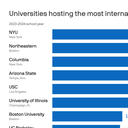Universities warn international students to return before Trump inauguration
A handful of top U.S. universities are urging international students who travel home for winter break to be back in the country before President-elect Trump takes office.
The big picture: Trump has vowed to crack down on both illegal and legal immigration, and school leaders are worried one of his first actions could be an executive order limiting entrance to the U.S. like he did with the Muslim Ban in 2017.
Driving the news: At least 10 universities, mostly on the East Coast, have told international students to be back stateside before the Jan. 20 inauguration. They include the University of Southern California, Brown University, University of Pennsylvania, MIT and others.
- USC in an email to students on special visas said they are expected to be in class when the semester starts on Jan. 13, and that this "is especially important given that a new presidential administration will take office on January 20, 2025, and — as is common — may issue one or more Executive Orders impacting travel to the U.S. and visa processing." The school shared the email with Axios.
- "While there's no certainty such orders will be issued, the safest way to avoid any challenges is to be physically present in the U.S. before the Spring semester" begins, the email stated.
Zoom in: Sercan Canbolat, director of Abrahamic Programs and adjunct professor at the University of Connecticut, came to the U.S. from Turkey in 2014 to get his doctorate degree and says that, out of precaution, he didn't travel outside the country during the first Trump term.
- He also says he won't when Trump returns to office in January because he "will take no risk" of not being able to get back in the U.S.
- Canbolat, who has a student visa, says he last visited Turkey in 2021 and wishes he could go back so his family can meet his wife and 6-month-old daughter.
- "It's not easy at all for me, for my family in Turkey. They want to meet her, they want to hold her."
Catch up quick: There are roughly 1.1 million students from other countries studying in the U.S., according to NAFSA: Association of International Educators, a global nonprofit that advocates for international study.
- Those students contribute $43.8 billion to the U.S. economy. They also often pay about triple the amount of tuition that state residents pay.
Reality check: Most universities are not issuing guidance.
- Emory University spokesperson Sylvia Carson said in an email to Axios that the school can't "speculate on anything related to the new administration at this time. Once real policies and mandates have been put into place we can discuss impacts, but it's premature at this stage."
- University of Colorado Boulder spokesperson Nicole Mueksch also said the school can't speculate but that it'll "continue to support" international students "regardless of who's in office."
- Arizona State University, which has the fourth-largest number of international students, is also not issuing guidance, per spokesperson Jerry Gonzalez.
What they're saying: Jill Allen Murray, deputy executive director of public policy at NAFSA, says it makes sense these schools "would try to avoid the risk of even one student experiencing a disruption to their study."
- But "I don't think we're hearing a lot from our members about this particular issue of needing to have students here before inauguration," Murray adds.
Editor's note: This story has been updated with the correct spelling of Sercan Canbolat's last name.



